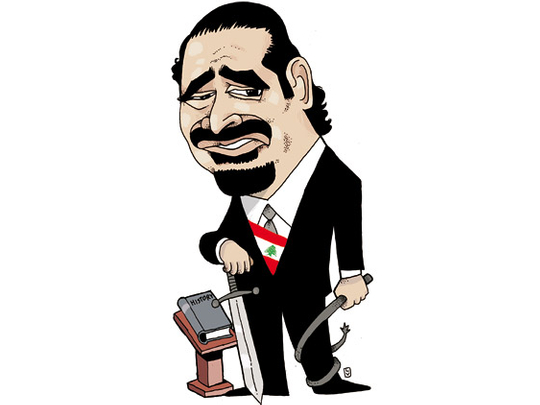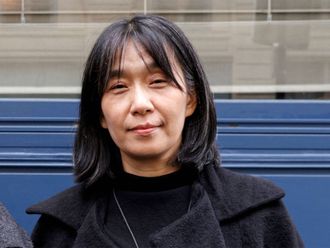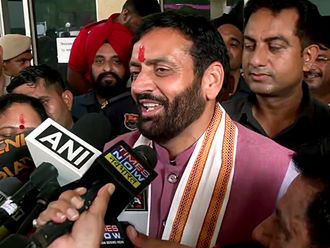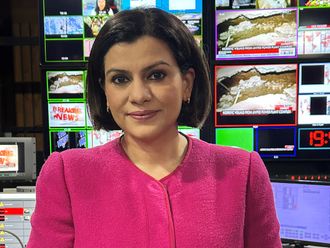
Mu'awiya Bin Abi Sufyan, founder of the Umayyad Dynasty, once famously said: "I do not apply my sword where my lash suffices; nor my lash where my tongue is enough. And even if there be one hair binding me to my fellow men, I do not let it break. When they pull, I loosen, and if they loosen, I pull."
Lebanese Prime Minister Sa'ad Hariri should learn from the legacy of the Umayyad Caliph in order to face the political crisis that is snowballing in Beirut between his March 14 Coalition and Hezbollah.
Hariri and his team are using the sword, the lash, and the tongue all simultaneously, making the ‘one hair' that binds them to their fellow countrymen incredibly microscopic, and very difficult to grasp. To put it simply, the Lebanese opposition agreed to join the Hariri cabinet in late 2009 only after the prime minister promised to "protect and embrace" the arms of Hezbollah.
It is now almost certain that an upcoming indictment by the Special Tribunal for Lebanon (STL) is preparing to name Hezbollah figures in the 2005 murder of his father, Rafik Hariri. From where Hezbollah sees things, this is a dramatic conspiracy against both the arms and legacy of Hezbollah, hatched by Israel and the West.
Anybody who does not work against the STL, they say, is clearly, part of the anti-Hezbollah conspiracy. Only Hariri can bring the entire STL episode to a halt. Hezbollah wants Hariri to come out and repeat what was spoken earlier this summer by Hassan Nasrallah earlier, accusing the STL of being an ‘Israeli project' and calling for its cancellation.
Under urging of heavyweights on March 14, however, Hariri still refuses to take such a step, still convinced, apparently, that the STL can bring his father's true murderers to international justice.
For its part, Hezbollah believes that for the past 11 months, it acted in tremendous good faith towards Hariri, helping him create a cabinet of national unity and facilitating his rapprochement with Damascus.
Had they insisted on holding a grudge, Hezbollah believes Hariri would have never made it to the premiership, regardless of how many seats his coalition commands in Parliament. It has since presented him with a long list of demands, which he repeatedly and very consciously, refused to grant.
Demands
Hezbollah wanted the prime minister to strike at "false witnesses" in the Hariri affair, which include, members of his immediate entourage in the Future Movement. Although during his last visit to Damascus, Hariri promised to bring false witnesses to justice; he has to date, taken no steps in this direction.
On the contrary, he continues to surround himself with figures like Fouad Siniora, Ameen Gemayel, and Samir Geagea, who worked against Hezbollah in 2006-09 and continue to preach anti-Hezbollah rhetoric. Hariri cannot have it both ways, Hezbollah seems to be saying — continuing to enjoy political support from Nasrallah while simultaneously, refusing to distance himself from his opponents in Lebanon.
If Hariri is not going to take immediate action against the STL, Hezbollah is implying that it has enough power — on the street and through Lebanese institutions — to bring down the entire Hariri cabinet. One recent measure has been to block official state funding for the STL through its veto power in the Lebanese government.
Lebanon has already paid, in February 2009 and February 2010, a total of 52 billion Lebanese pounds (Dh124.91 million) to the STL. That has to come to a halt, says Hezbollah, since this funding is unconstitutional as it was never approved by Parliament.
Hezbollah controls 11 out of 30 seats in the Lebanese cabinet and can call for a vote of no confidence for the Lebanese Prime Minister. If matters escalate even further, it can take to the streets bringing Lebanon to a social, economic, and political gridlock, as it did in 2006-08.
For his part, Hariri is threatening to sulk — go into political seclusion — until the crisis is solved. That was a practice often taken by his father whenever tension became unbearable in the complex world of Beirut politics. Or he might make an even more drastic move, resigning from office to turn the tables on those trying to hamper his political programme.
If he does take such dramatic action, Hezbollah would see it as a blessing in disguise, hurrying to replace him with a prime minister who can deliver what it wants. Hezbollah feels that Hariri has lost his Arab political umbrella: the Syrians are disappointed with the man and Saudi Arabia is unwilling to immerse itself in micro-Lebanese affairs.
According to Al Akhbar, a political daily close to Hezbollah, "Syria's doors are closed before Hariri and his team, at least momentarily" because "Syria has no time to waste in building confidence with those who have no confidence in themselves."
With no Syria and no Saudi Arabia behind him, and a US administration very distant from Lebanese problems, Hariri stands exposed and very vulnerable, likely to collapse any minute now, if the right buttons are not pushed — fast — with Nasrallah and Damascus.
Sami Moubayed is editor-in-chief of Forward Magazine in Syria.











